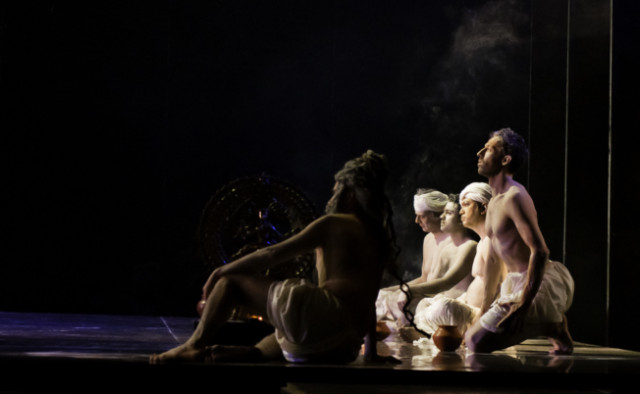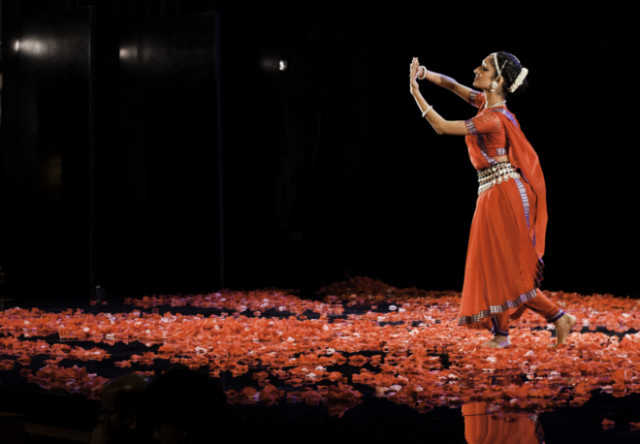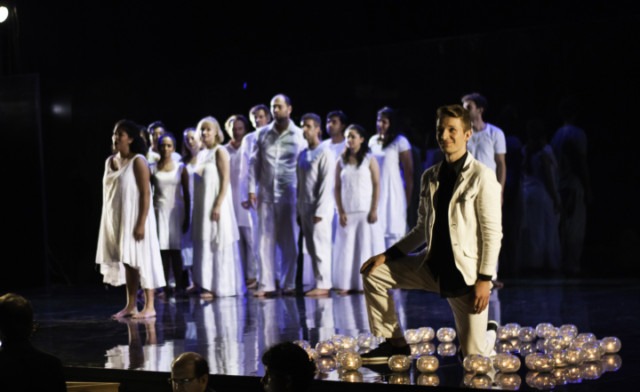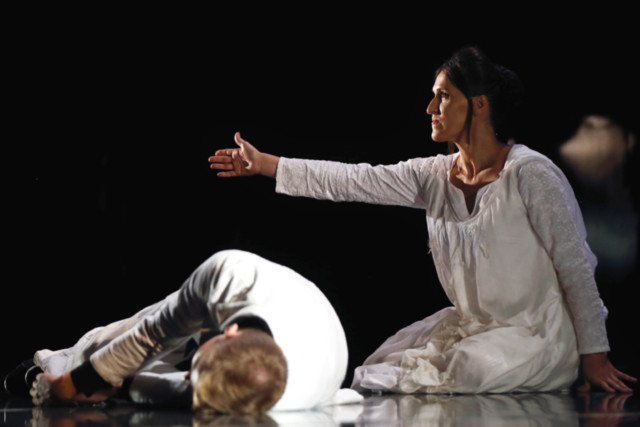
The Neemrana Music Foundation, along with Akademia and Cite de la Musique, Paris recently staged an opera “Orfeo, Crossing the Ganges” in New Delhi. It was adapted from the first ever opera “L’Orfeo: Favola in Musica”, composed in 1607 by Claudio Monteverdi, who merged the arts of poetry, theatre and music for the first time.
The opera was performed in Paris at Cite de la Musique on October 5, 2013, by more than 50 Indo-French artists. Its production is different in the sense that it has been designed for both Indian as well as Western audiences. The international opera, though tweaked with an Indian subtext, has proved that music and poetry can bridge the gap between different countries and cultures.
Francis Wacziarg, producer of the opera, informs, “An ambitious project, it took two years to prepare in France and Delhi. The opera transposes the Greek myth about the fabled bard’s unsuccessful attempt to bring his beloved back from hell to the earth.”
In “Orfeo, Crossing the Ganges”, stage director Francois Rancillac and conductor Francoise Lasserre reveal a spectacle built on a reciprocal understanding between Occidental and Indian cultures.
Wacziarg provides details: “The link between the two worlds is reinforced by the Indian and European cast, trained on several occasions by Lasserre during workshops held in India in the last few months. The five-act opera is based on the mythical Greek love story on the legend of Orpheus (also called Orfeo) and Eurydice.
“Orfeo, the main character, who is a semi-god and hero, travels to India and falls in love with Eurydice, the dancer, who is in the holy service of Hindu god Shiva. Orfeo kidnaps and marries her invoking Shiva’s wrath, who sends the cobra around his neck to punish Eurydice. The snake stings Eurydice and she dies.
“Orfeo has to now traverse to the world beyond the living. His quest to find his beloved after her death means crossing river Ganges to reach the sacred city of Varanasi (also referred to as Benares), in Uttar Pradesh, located in northern India. His love takes him to Hades (ancient Greek god, whose name eventually came to designate the abode of the dead) on a futile search of his deceased wife.”
To get through the doors of hell, Orfeo uses his singing and lyre-playing talents to charm the gods and the people in hell. He impresses them and is told that he can take Eurydice with him to earth on one condition: he should walk in front of her and not look back until they both have reached the upper world. He sets off with Eurydice following him, but in his anxiety, as soon as he reaches the upper world, he turns and looks back at her, forgetting that both needed to reach the upper world. Thus, Eurydice vanishes — never to come back again.
All through the opera Eurydice has been shown as a coy Indian bride, whose culture prevents her from expressing her emotions in music and she is not allowed to sing at her wedding. This is unlike Orfeo, who comes from a different background.
Rancillac delves into some more aspects of the opera: “It was divided in five acts for the Indian audience, with the first half having two acts with variations of different kinds of music — slow, fast and dense.”
When Eurydice dies in the second act, even Orfeo changes as a character and so does the music. Later, when the journey of Orfeo is shown, the music is fast. And when he dies, the Indian classical music is done away with.
Even though operas have not been very popular in India and the country does not have a fully equipped opera house yet, Wacziarg and his partner Aman Nath’s Neemrana Music Foundation has been staging operas with an Indian mood in New Delhi, Mumbai and Kolkata since 2002.
Heartened by the reception of the past productions, Wacziarg says, “The audience for operas is fast catching up in the country. And youngsters, who have never been to an opera before, are taking keen interest in these. Our purpose is not to get troupes from abroad and make them perform here and leave, but introduce more Indian singers and performers, as there is immense talent in the country. It is just that artists need exposure and their skills can be honed.”
The “Orfeo, Crossing the Ganges” project took shape after the Akademia approached the Neemrana Music Foundation with the concept. Wacziarg says, “Since it has been our dream to offer people opportunities to learn and express their creativity, we considered this venture a perfect match, along with Akademia’s vision. A team from Paris came to India thrice to conduct workshops with Indian artists.”
Akademia is a French ensemble founded by Lasserre with the aim of recreating key vocal and instrumental pieces of the 17th and 18th centuries. It is one of the most active and independent European ensembles, committed to introducing a wide range of audiences to its repertory and facilitates the early career of young professional musicians.
The 50 artists involved with “Orfeo” included ten solo singers, eight Indian musicians, 18 musicians from Akademia and the Neemrana Vocal Ensemble. The opera had an eclectic mix of performers from across the globe and the artists were from Argentina, Brazil, Czechoslovakia, Belgian and Germany.
Hungarian singer David Szigetvari, the 2012 winner of Johann Sebastian Bach International Competition in Leipzig, Germany, essayed the title role of Orfeo, with Nitya Urbanna Vaz as Eurydice. Aude Priya a veteran with operas is cast as Proserpina (Queen of Hades in the Greek myth) and Sabine Siegwait designed the set and costumes, with Dominique Fortin on the lighting design.
A highlight of the production was the use of very rare, elaborate and ancient instruments of Monteverdi’s time. Instruments such as theorbo, the organ, viola da gamba and harpsichord, were brought along by Akademia, which proved to be a magical experience for the Indian audience.
The Indian musicians, including Murad Ali, Sanjeev, Ashwani Shankar, Mithilesh Jha and Mohan Shyam Sharma played the sarangi, shehnai, tabla and pakhawaj. Choreographer Arushi Mudgal, cast as the soul of Eurydice, performed Odissi dance during the scenes scored for Hindustani classical music and movements.
Wacziarg exulted, “Sounds of the Western instruments blended beautifully with the strains of the Indian instruments in the oldest existing opera, which has been performed extensively across the world. We Indianised Orfeo without giving in to fusion and the audience was simply thrilled and responded very well to the similarity between Indian and Western music.”
Nilima Pathak is a New Delhi-based journalist.





